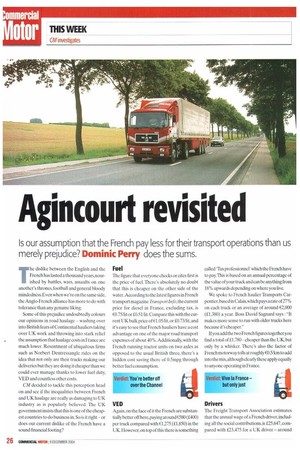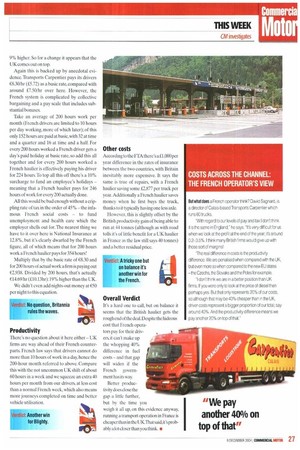Agincourt revisited
Page 26

Page 27

If you've noticed an error in this article please click here to report it so we can fix it.
Is our assumption that the French pay less for their transport operations than us merely prejudice? Dominic Perry does the sums.
The dislike between the English and the French has lasted a thousand years,nourished by battles, wars, assaults on one another's thrones, football and general bloody mindedness.Even when we're on the same side, the Anglo-French alliance has more to do with tolerance than any genuine liking.
Some of this prejudice undoubtedly colours our opinions in road haulage — washing over into British fears of Continental hauliers taking over UK work and throwing into stark relief the assumption that haulage costs in France are much lower. Resentment of ubiquitous firms such as Norbert Dentressangle rides on the idea that not only are their trucks making our deliveries but they are doing it cheaper than we could ever manage thanks to lower fuel duty, VED and countless other costs.
CM decided to tackle this perception head on and see if the inequalities between French and UK haulage are really as damaging to UK industry as is popularly believed. The UK government insists that this is one of the cheapest countries to do business in. So is it right — or does our current dislike of the French have a sound financial footing?
Fuel
The figure that everyone checks or cites first is the price of fuel. There's absolutely no doubt that this is cheaper on the other side of the water. According to the latest figures in French transport magazine TransportInfo,the current price for diesel in France, excluding tax, is €0.75/lit or £0.51/lit. Compare this with the current UK bulk price of €1.05/lit, or £0.73/lit, and it's easy to see that French hauliers have a cost advantage on one of the major road transport expenses of about 40%. Additionally, with the French running tractor units on two axles as opposed to the usual British three, there's a hidden cost saving there of 0.5mpg through better fuel consumption.
Again, on the face of it the French are substantially better off here, paying around €580 (£400) per truck compared with €1,275 (£1,850) in the UK. However, on top of this there is something called Tax professionnel' which the French have to pa This is based on an annual percentage of the value of your truck and can be anything from 18% upwards depending on where you five.
We spoke to French haulier Transports Carpen tier, based in Calais, w hich pays a rate of 27% on each truck or an average of around €2,000 (£1,380) a year. Boss David Sagnard says : "It makes more sense to run with older trucks here because it's cheaper."
If you add the two French figures together you find a total of £1,780 cheaper than the UK, but only by a whisker. There's also the factor of French motorway tolls at roughly €0.5/km to add into the mix,although clearly these apply equally to anyone operating in France.
Drivers The Freight Transport Association estimates that the annual wage of a French driver, including all the social contributions, is 125,647, compared with £23,475 for a UK driver — around 9% higher. So for a change it appears that the UK comes out on top.
Again this is backed up by anecdotal evidence. Transports Carpentier pays its drivers €8.30/hr (£5.72) as a basic rate, compared with around £7.50/hr over here. However, the French system is complicated by collective bargaining and a pay scale that includes substantial bonuses.
Take an average of 200 hours work per month (French drivers are limited to 10 hours per day working, more of which later); of this only 152 hours are paid at basic, with 32 at time and a quarter and 16 at time and a half. For every 200 hours worked a French driver gets a day's paid holiday at basic rate, so add this all together and for every 200 hours worked a French haulier is effectively paying his driver for 224 hours. To top all this off there's a 10% surcharge to fund an employee's holidays — meaning that a French haulier pays for 246 hours of work for every 200 actually done.
All this would be bad enough without a crippling rate of tax in the order of 45% —the infamous French social costs — to fund unemployment and health care which the employer shells out for. The nearest thing we have to it over here is National Insurance at 12.8%, but it's clearly dwarfed by the French figure, all of which means that for 200 hours work a French haulier pays for 354 hours!
Multiply that by the basic rate of €8.30 and for 200 hours of actual work a firm is paying out €2,938. Divided by 200 hours, that's actually €14.69/hr (£10.13hr): 19% higher than the UK.
We didn't even add nights-out money at €50 per night to this equation.
Productivity
There's no question about it here either — UK firms are way ahead of their French counterparts. French law says that drivers cannot do more than 10 hours of work in a day, hence the 200-hour month referred to above. Compare this with the not uncommon UK shift of about 60 hours in a week and we squeeze an extra 40 hours per month from our drivers, at less cost than a normal French week, which also means more journeys completed on time and better vehicle utilisation.
Other costs
According to the FTA there's a £1,000 per year difference in the rates of insurance between the two countries, with Britain inevitably more expensive. It says the same is true of repairs, with a French haulier saving some £2,877 per truck per year. Additionally a French haulier saves money when he first buys the truck, thanks to it typically having one less axle.
However, this is slightly offset by the British productivity gain of being able to run at 44 tonnes (although as with road tolls it's of little benefit for a UK haulier in France as the law still says 40 tonnes) and a better residual price.
Overall Verdict
It's a hard one to call, but on balance it seems that the British haulier gets the rough end of the deal.Despite the hideous cost that French opera tors pay for their drivers, it can't make up the whopping 40% difference in fuel costs — and that gap will widen if the French government has its way.
Better productivity does close the gap a little further, but by the time you weigh it all up, on this evidence anyway, running a transport operation in France is cheaper than in the UK.That said,it's probably a lot closer than you think. •


























































































































































































